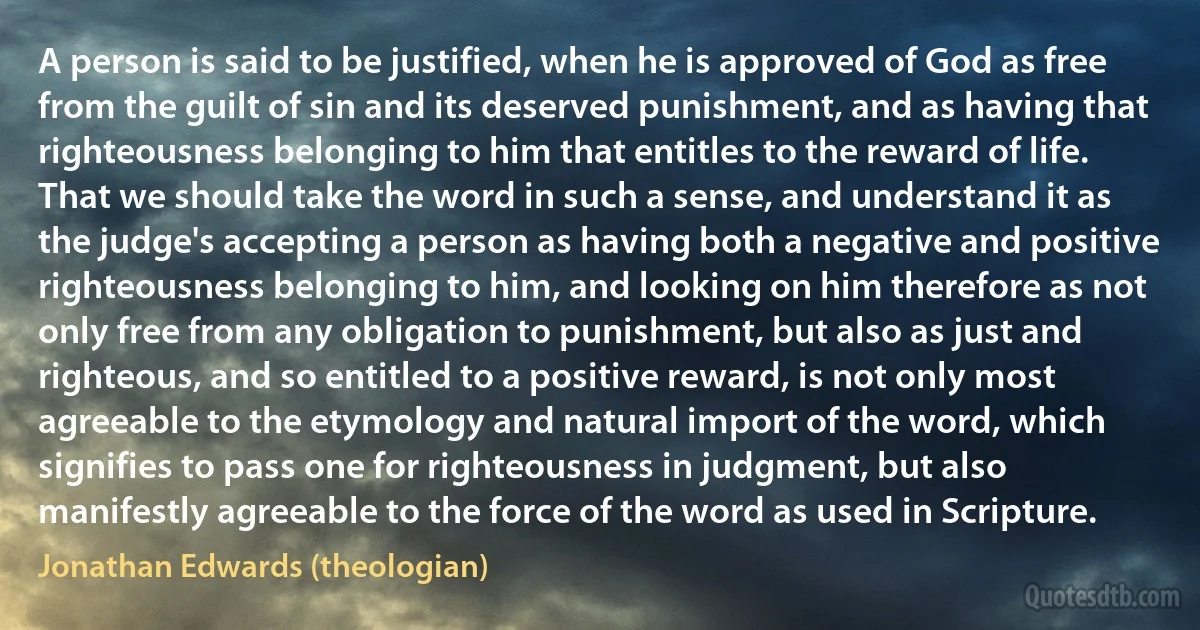
A person is said to be justified, when he is approved of God as free from the guilt of sin and its deserved punishment, and as having that righteousness belonging to him that entitles to the reward of life. That we should take the word in such a sense, and understand it as the judge's accepting a person as having both a negative and positive righteousness belonging to him, and looking on him therefore as not only free from any obligation to punishment, but also as just and righteous, and so entitled to a positive reward, is not only most agreeable to the etymology and natural import of the word, which signifies to pass one for righteousness in judgment, but also manifestly agreeable to the force of the word as used in Scripture.
Jonathan Edwards (theologian)Related topics
etymology force free guilt having import judgment life looking natural pass person punishment reward say sense should sin take wordRelated quotes
I stand for the square deal. But when I say that I am for the square deal, I mean not merely that I stand for fair play under the present rules of the game, but that I stand for having those rules changed so as to work for a more substantial equality of opportunity and of reward for equally good service. One word of warning, which, I think, is hardly necessary in Kansas. When I say I want a square deal for the poor man, I do not mean that I want a square deal for the man who remains poor because he has not got the energy to work for himself. If a man who has had a chance will not make good, then he has got to quit. And you men of the Grand Army, you want justice for the brave man who fought, and punishment for the coward who shirked his work. Is that not so?

Theodore Roosevelt
The Age of Empty Freedom ... does not know that man must first through labour, industry, and art, learn how to know; but it has a certain fixed standard for all conceptions, and an established Common Sense of Mankind always ready and at hand, innate within itself and there present without trouble on its part;-and those conceptions and this Common Sense are to it the measure of the efficient and the real. It has this great advantage over the Age of Science, that it knows all things without having learned anything; and can pass judgment upon whatever comes before it at once and without hesitation,-without needing any preliminary evidence:-'That which I do not immediately comprehend by the conceptions which dwell within me, is nothing,'-says Empty Freedom.

Johann Gottlieb Fichte
When issues of events like these my father is waiting for, are hanging in the scales of fate, the mind has the advantage of changing the principle of expectation three times, without which it would not have power to see it out.Curiosity governs the first moment; and the second moment is all economy to justify the expense of the first - and for the third, fourth, fifth, and sixth moments, and so on to the day of judgment - 'tis a point of HONOUR.I need not be told, that the ethic writers have assigned this all to Patience; but that VIRTUE, methinks, has extent of domination sufficient of her own, and enough to do in it, without invading the few dismantled castles which HONOUR has left him upon the earth.

Laurence Sterne
When we think of eternity, and of the future consequences of all human conduct, what is there in this life that should make any man contradict the dictates of his conscience, the principles of justice, the laws of religion, and of God? Sir, the nature and all the circumstances of this trade are now laid open to us; we can no longer plead ignorance, we can not evade it; it is now an object placed before us, we can not pass it; we may spurn it, we may kick it out of our way, but we can not turn aside so as to avoid seeing it; for it is bro directly before our eyes that this House must decide, and must justify to all the world, and to their own consciences, the rectitude of the grounds and principles of their decision.

William Wilberforce
[To work is to pray. ] By the Puritan moralist the ancient maxim is repeated with a new and intenser significance. The labor which he idealizes is not simply a requirement imposed by nature, or a punishment for the sin of Adam. It is itself a kind of ascetic discipline, more rigorous than that demanded of any order of mendicants-a discipline imposed by the will of God, and to be undergone, not in solitude, but in the punctual discharge of secular duties. It is not merely an economic means, to be laid aside when physical needs have been satisfied. It is a spiritual end, for in it alone can the soul find health, and it must be continued as an ethical duty long after it has ceased to be a material necessity.

R. H. Tawney
